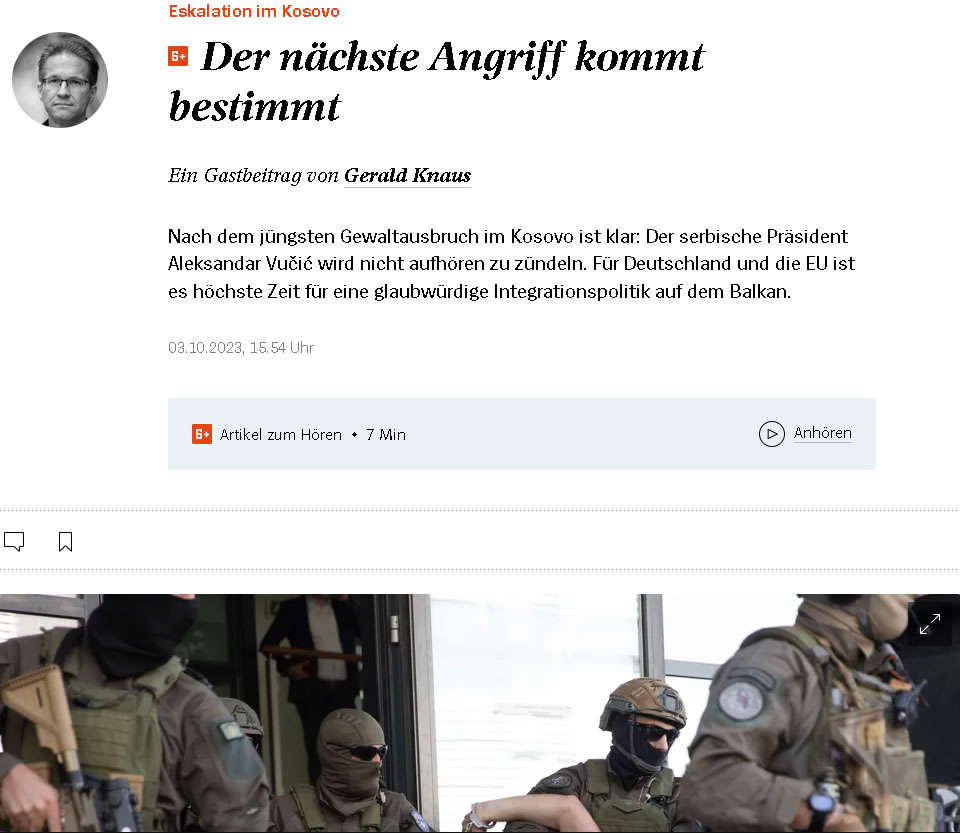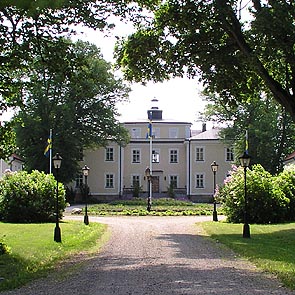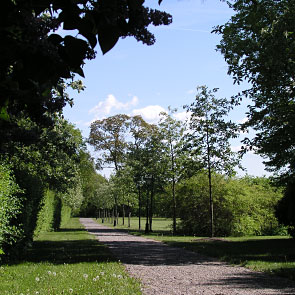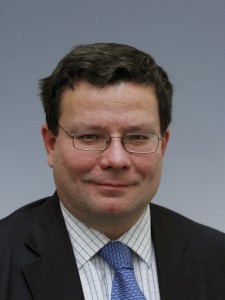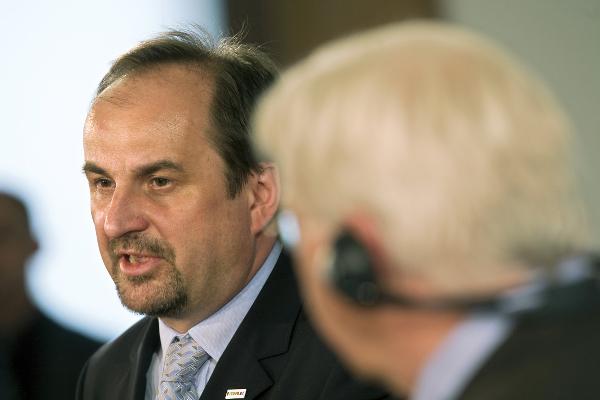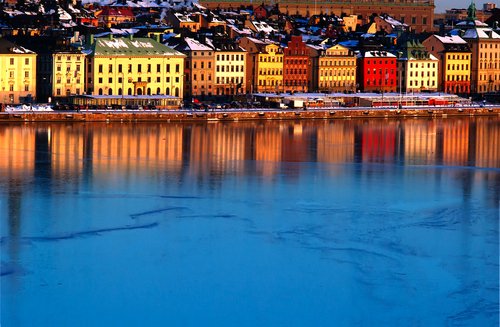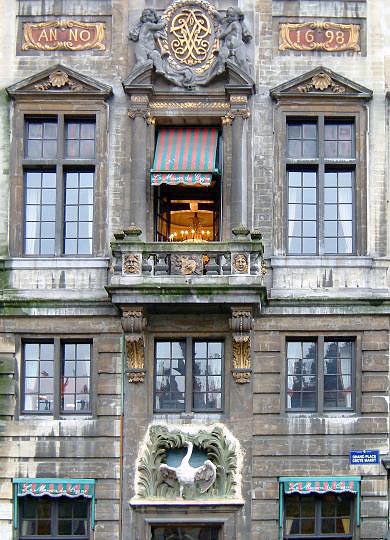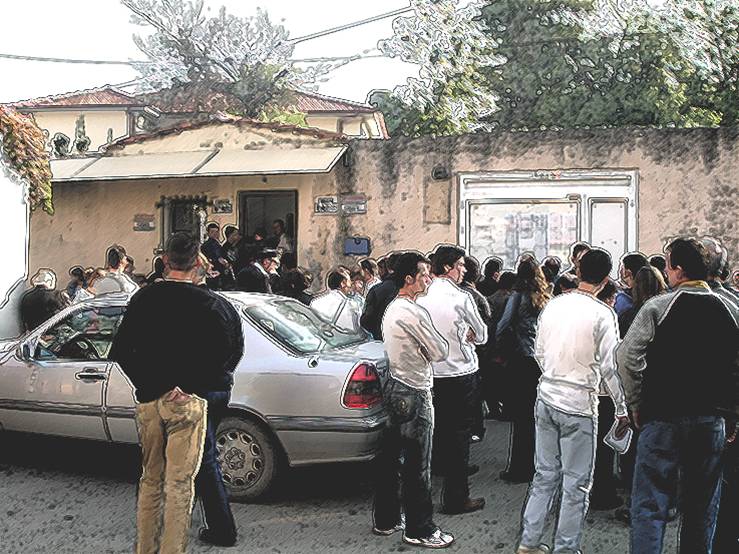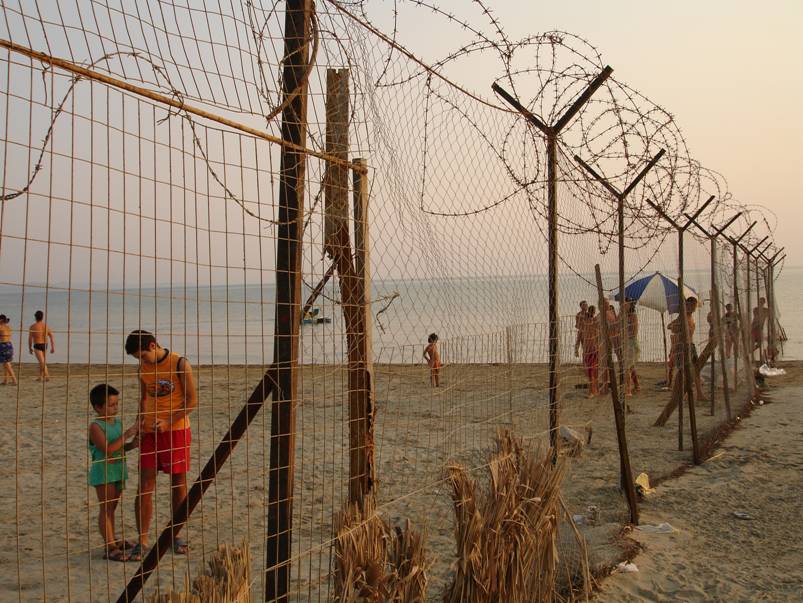A guest article by Gerald Knaus
This article was first published in German by Der Spiegel on 3 October 2023: Der nächste Angriff kommt bestimmt
After the latest outbreak of violence in Kosovo, it is clear: Serbian President Aleksandar Vučić will not stop playing with fire. For Germany and the EU, it is high time for a credible integration policy in the Balkans.
In mid-August, I was sitting in a café in Gracanica, a Serb-majority community south of Pristina, the capital of Kosovo. Across the street, in front of the town hall, a large Serbian flag was flying. In the car park were cars from the police station, where a multi-ethnic police force was on duty. I paid the Serbian waiter in euros, the official currency in Kosovo, and then wandered past a large poster of Serbian President Aleksandar Vučić to the Orthodox monastery with its medieval murals of heaven and hell. And finally stood at a crossroads in front of the equestrian statue of a Serbian hero of the Battle of the Field of Blackbirds in 1389. In front of it a writing in Serbian: “Ja volim Gracanicu”, “I love Gracanica.”
If Serbian President Aleksandar Vučić is to be believed, the peaceful small town of Gracanica, with Serbian schools, hospitals, and bilingual street signs, is an illusion. For years, he and his ministers have been warning of state-organised pogroms against Kosovo’s Serb minority, now estimated at just over 100,000, and threatening a military response “to protect them” if that happens. For several months, however, they have been declaring, on Serbian television as well as in letters to MPs around the world, that these pogroms and state “terror” against Serbs are taking place. At the beginning of July, Vučić declared that Nato had “two weeks” left to disarm the Kosovar police in northern Kosovo, otherwise he would have no choice but to protect Kosovo’s Serbs themselves from Albanian terror.

“Hunting Serbs! Displaced Krajina Serbs [Serbs in Croatia] who wanted to visit their villages are arrested on the border … This is one example of “silent exodus” that is applied also in the so-called state of Kosovo, says Savo Strbac (Vesti, 10 July 2023)
Kurti: I want “Operation Storm” in Kosovo. I offered Serbs from the North the Croatian model, which is a success-story, said Albin Kurti. With that he openly stated that the goal is to expel the Serb population (Informer, 12 July 2023)
Epidemic of dangerous ideas: Kosovo crisis should be solved by ethnic cleansing of Serbs?! (Blic, 13 July 2023)
KFOR and the West are encouraging Pristina to sow fear (Politika, 15 July 2023)
Taking inflammatory rhetoric seriously
As for these pogroms: they do not exist. The international organisations stationed in Kosovo know this, of course. But instead of remembering the early nineties, taking inflammatory rhetoric seriously and countering it, the EU, including Germany, decided as recently as June to take “measures” against the government in Pristina: contacts were reduced, aid frozen. The demand on Pristina: it should relax the situation in the north bordering Serbia by withdrawing its special police. This has long been a demand from Belgrade. Why became obvious now, on 24 September, on a dramatic Sunday.
On that day, dozens of Serb paramilitaries with heavy weapons attacked the Kosovar police, shot one policeman, wounded another, and retreated to an Orthodox monastery. Their leader, who has since admitted his role: Milan Radoičić, the dominant Serb politician in Kosovo, Vučić’s man on the ground. The reaction to these attacks, however, came not from the international peacekeeping force Kfor, but from the Kosovar police, pressured by Vučić to retreat. They shot some of the paramilitaries and freed the trapped pilgrims in the monastery. The attempt to start a conflagration failed, but the killed paramilitaries were immediately hailed as heroes in Serbia. The government set a national day of mourning. And although Radoičić admitted his crime, he remained at large.
Now the evidence presented by the government in Pristina that the action was directed by Belgrade must be examined closely. In fact, at the moment everything points to the fact that dozens of heavily armed paramilitaries acted on behalf of the Serbian state. Unofficially, American and European officials confirm this.
What now? The priority of European policy in the Balkans must be to stop all further violence, which could also quickly lead to a new refugee crisis. To do this, the failure of previous policies must be acknowledged and corrected. For nothing about the latest of this escalation was surprising. Back at the end of July, the think tank I founded, the European Stability Initiative (ESI), published a detailed report entitled “Belfast, Kosovo and the End of Peace.” “Belfast” because the 1969 scenario, where paramilitaries became the main players in Northern Ireland for decades, and even the strong British army failed to stop the violence, is again the most likely path to a new hell.
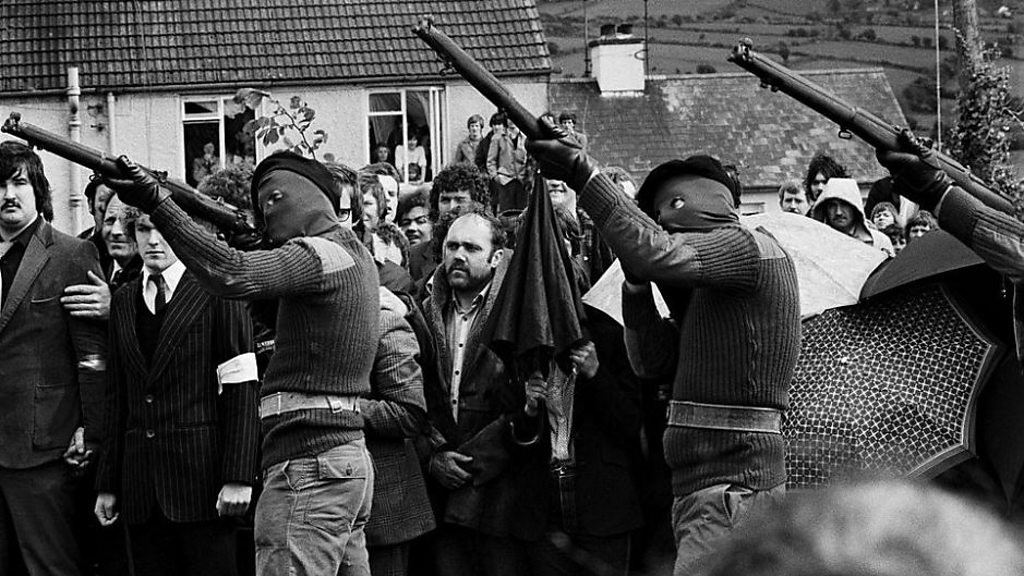
When pogroms are invented, they are followed by violence
In Brussels and Berlin, some saw these warnings as exaggerated. They ignored what Serbian politicians announced every day in their media. Yet this is the most important lesson from the dramatic failure of international diplomacy in the Balkans in the early 1990s: It is not what politicians say in English that counts, but how they speak to their own people, what campaigns they run in the media they control and, above all, how they act. In late May 2023, violent demonstrators reinforced from Serbia attacked Kfor soldiers in northern Kosovo so aggressively that dozens of Italian and Hungarian military personnel were injured, some seriously. In early June, Serbian special forces abducted Kosovar police officers who were trying to prevent smuggling, including of weapons, in northern Kosovo. In both cases, there was little reaction from Nato and the EU. Vučić and his proxy Radoičić had to feel encouraged.
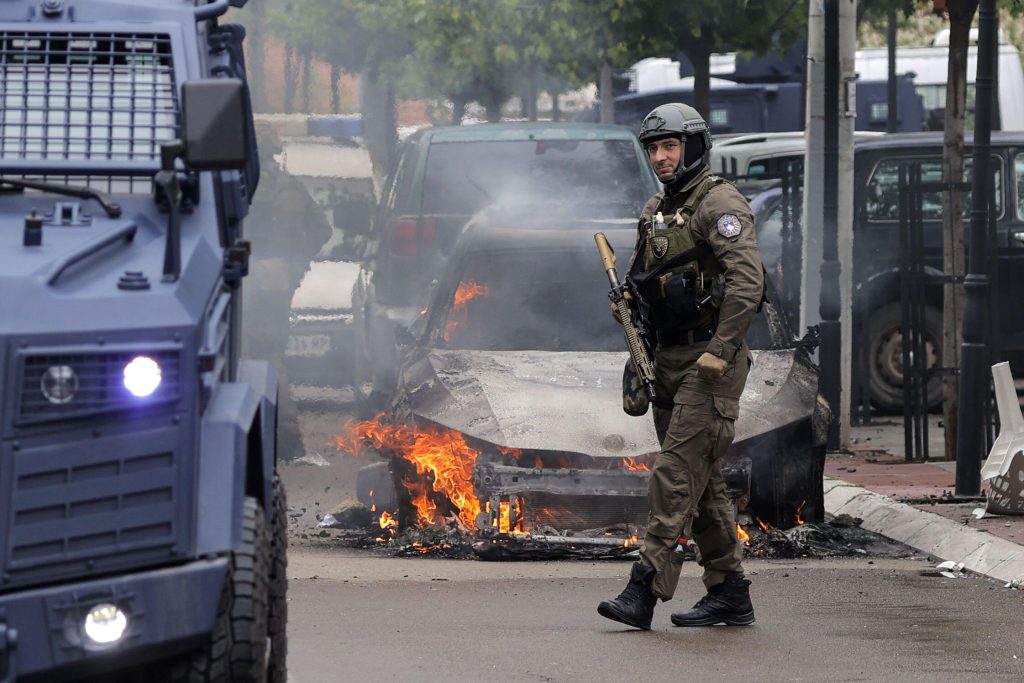
If one takes seriously what is currently being said by politicians in Belgrade, then one thing is certain: the next attack is bound to come. The lesson: If pogroms are invented, then violence follows. If they are not called out, the situation will escalate further. Of course, Serbia will not take on Nato directly. Aleksandar Vučić, who was the Secretary General of the ultra-nationalist Serbian Radical Party led by Vojislav Šešelj in the 1990s and was the Minister of Propaganda in a government led by Slobodan Milošević in Belgrade in 1999, remembers the fate of his former superiors: Šešelj and Milošević ended up before an international court in The Hague. Vučić will want to avoid this. And that means: if the USA and Berlin now threaten him with severe consequences, should there be violence again like this September, then a policy of deterrence would have a good chance of success, at least in the short term. Also because Vučić, like his closest ally in the EU, Hungary’s Prime Minister Orbán, will hope that world politics could still change fundamentally in his favour anyway with Trump’s return to the White House in early 2025.
For Germany and the EU, this means: By the end of 2024, we must finally succeed in making violence like that in Northern Ireland in the decades after 1969 as unthinkable in the Balkans as it is today in Central Europe. This means replacing the empty phrases of the “European perspective” and “accelerated integration” of the Balkans, which Aleskandar Vučić has been publicly mocking for years, with a credible integration policy that people can believe in.
A realistic vision for a Berlin peace policy
In concrete terms, the EU could declare at the EU Council in December that it would be ready to grant every Balkan country – including Serbia and Kosovo – access to the EU’s internal market and the EU’s four freedoms by 2028. If they had made all the necessary reforms, strengthened the rule of law and secured minority rights by then. This would also apply to Serbs in Kosovo. That would be an enormously attractive goal. And it would be a vision for the Balkans: by 2030, the borders there should become as invisible in people’s everyday lives as the borders between Poland and Lithuania and Germany and the Netherlands are today. A border between Serbia and Kosovo should soon look like the invisible border between Ireland and Northern Ireland. And without which peace would immediately be in danger there as well.
Invisible borders instead of shifting borders. Minority rights everywhere in the Balkans instead of expulsions, as in Karabakh today. Kosovo and Serbia as neighbours integrated into a European community of law. In addition, access to the large common market. That was the recipe for success of EU integration from 1950 to 1992. In addition, deterrence of all those who rely on violence. That would be a realistic vision for a Berlin peace policy today.
Before it is too late for that. Who is betting on this could also be seen last week when AfD leader Chrupalla rushed to Belgrade and promised Vučić his support.

